Accounting Issues: Current Development in Accounting
VerifiedAdded on 2023/06/04
|17
|3935
|108
AI Summary
This report discusses the accounting issues in the management of accounting system of companies which are headed under the accounting standards and reporting system. It also addresses the views and opinions of different companies in regard to an upcoming standard of accounting in Australia.
Contribute Materials
Your contribution can guide someone’s learning journey. Share your
documents today.
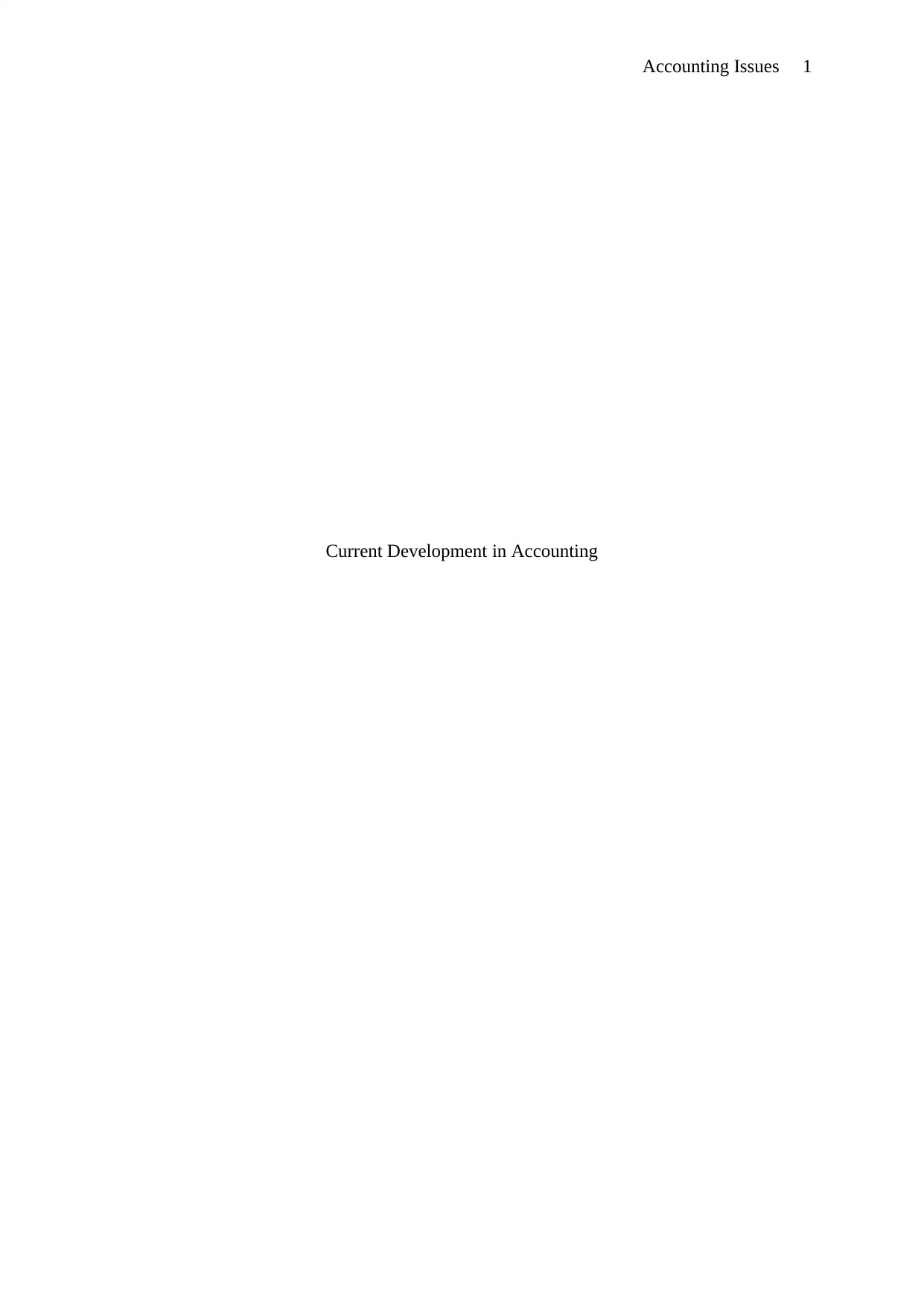
Accounting Issues 1
Current Development in Accounting
Current Development in Accounting
Secure Best Marks with AI Grader
Need help grading? Try our AI Grader for instant feedback on your assignments.
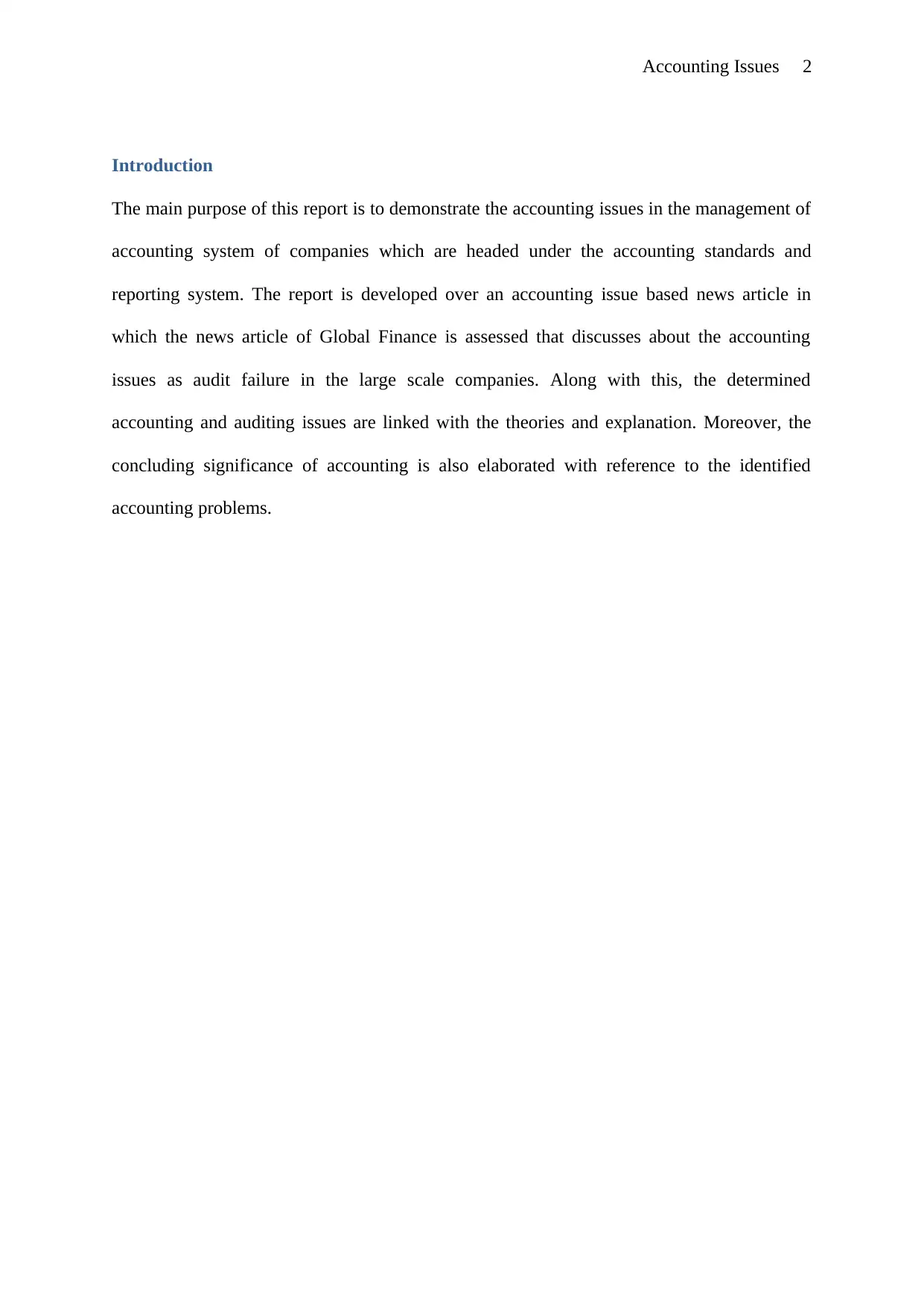
Accounting Issues 2
Introduction
The main purpose of this report is to demonstrate the accounting issues in the management of
accounting system of companies which are headed under the accounting standards and
reporting system. The report is developed over an accounting issue based news article in
which the news article of Global Finance is assessed that discusses about the accounting
issues as audit failure in the large scale companies. Along with this, the determined
accounting and auditing issues are linked with the theories and explanation. Moreover, the
concluding significance of accounting is also elaborated with reference to the identified
accounting problems.
Introduction
The main purpose of this report is to demonstrate the accounting issues in the management of
accounting system of companies which are headed under the accounting standards and
reporting system. The report is developed over an accounting issue based news article in
which the news article of Global Finance is assessed that discusses about the accounting
issues as audit failure in the large scale companies. Along with this, the determined
accounting and auditing issues are linked with the theories and explanation. Moreover, the
concluding significance of accounting is also elaborated with reference to the identified
accounting problems.
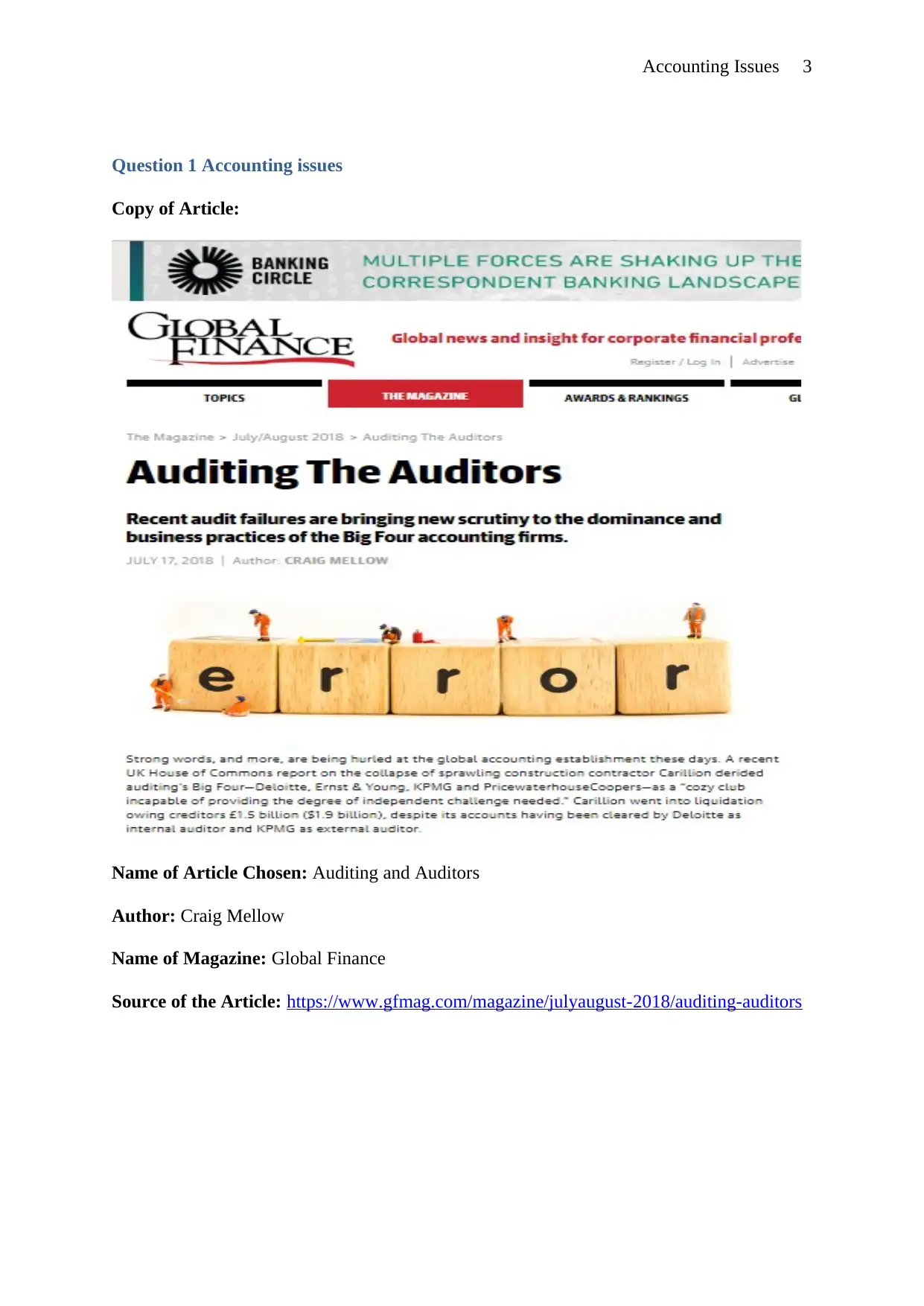
Accounting Issues 3
Question 1 Accounting issues
Copy of Article:
Name of Article Chosen: Auditing and Auditors
Author: Craig Mellow
Name of Magazine: Global Finance
Source of the Article: https://www.gfmag.com/magazine/julyaugust-2018/auditing-auditors
Question 1 Accounting issues
Copy of Article:
Name of Article Chosen: Auditing and Auditors
Author: Craig Mellow
Name of Magazine: Global Finance
Source of the Article: https://www.gfmag.com/magazine/julyaugust-2018/auditing-auditors
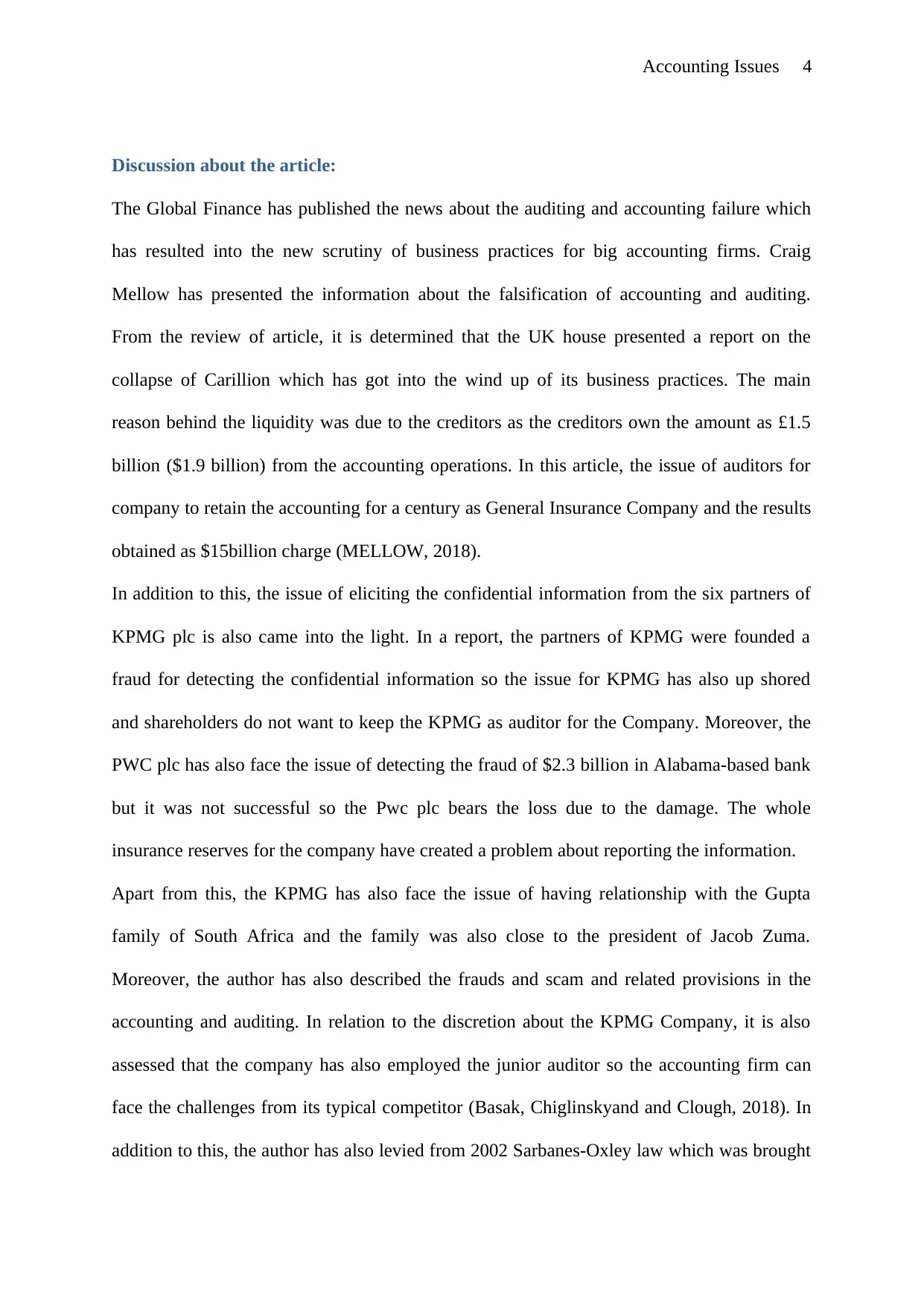
Accounting Issues 4
Discussion about the article:
The Global Finance has published the news about the auditing and accounting failure which
has resulted into the new scrutiny of business practices for big accounting firms. Craig
Mellow has presented the information about the falsification of accounting and auditing.
From the review of article, it is determined that the UK house presented a report on the
collapse of Carillion which has got into the wind up of its business practices. The main
reason behind the liquidity was due to the creditors as the creditors own the amount as £1.5
billion ($1.9 billion) from the accounting operations. In this article, the issue of auditors for
company to retain the accounting for a century as General Insurance Company and the results
obtained as $15billion charge (MELLOW, 2018).
In addition to this, the issue of eliciting the confidential information from the six partners of
KPMG plc is also came into the light. In a report, the partners of KPMG were founded a
fraud for detecting the confidential information so the issue for KPMG has also up shored
and shareholders do not want to keep the KPMG as auditor for the Company. Moreover, the
PWC plc has also face the issue of detecting the fraud of $2.3 billion in Alabama-based bank
but it was not successful so the Pwc plc bears the loss due to the damage. The whole
insurance reserves for the company have created a problem about reporting the information.
Apart from this, the KPMG has also face the issue of having relationship with the Gupta
family of South Africa and the family was also close to the president of Jacob Zuma.
Moreover, the author has also described the frauds and scam and related provisions in the
accounting and auditing. In relation to the discretion about the KPMG Company, it is also
assessed that the company has also employed the junior auditor so the accounting firm can
face the challenges from its typical competitor (Basak, Chiglinskyand and Clough, 2018). In
addition to this, the author has also levied from 2002 Sarbanes-Oxley law which was brought
Discussion about the article:
The Global Finance has published the news about the auditing and accounting failure which
has resulted into the new scrutiny of business practices for big accounting firms. Craig
Mellow has presented the information about the falsification of accounting and auditing.
From the review of article, it is determined that the UK house presented a report on the
collapse of Carillion which has got into the wind up of its business practices. The main
reason behind the liquidity was due to the creditors as the creditors own the amount as £1.5
billion ($1.9 billion) from the accounting operations. In this article, the issue of auditors for
company to retain the accounting for a century as General Insurance Company and the results
obtained as $15billion charge (MELLOW, 2018).
In addition to this, the issue of eliciting the confidential information from the six partners of
KPMG plc is also came into the light. In a report, the partners of KPMG were founded a
fraud for detecting the confidential information so the issue for KPMG has also up shored
and shareholders do not want to keep the KPMG as auditor for the Company. Moreover, the
PWC plc has also face the issue of detecting the fraud of $2.3 billion in Alabama-based bank
but it was not successful so the Pwc plc bears the loss due to the damage. The whole
insurance reserves for the company have created a problem about reporting the information.
Apart from this, the KPMG has also face the issue of having relationship with the Gupta
family of South Africa and the family was also close to the president of Jacob Zuma.
Moreover, the author has also described the frauds and scam and related provisions in the
accounting and auditing. In relation to the discretion about the KPMG Company, it is also
assessed that the company has also employed the junior auditor so the accounting firm can
face the challenges from its typical competitor (Basak, Chiglinskyand and Clough, 2018). In
addition to this, the author has also levied from 2002 Sarbanes-Oxley law which was brought
Secure Best Marks with AI Grader
Need help grading? Try our AI Grader for instant feedback on your assignments.
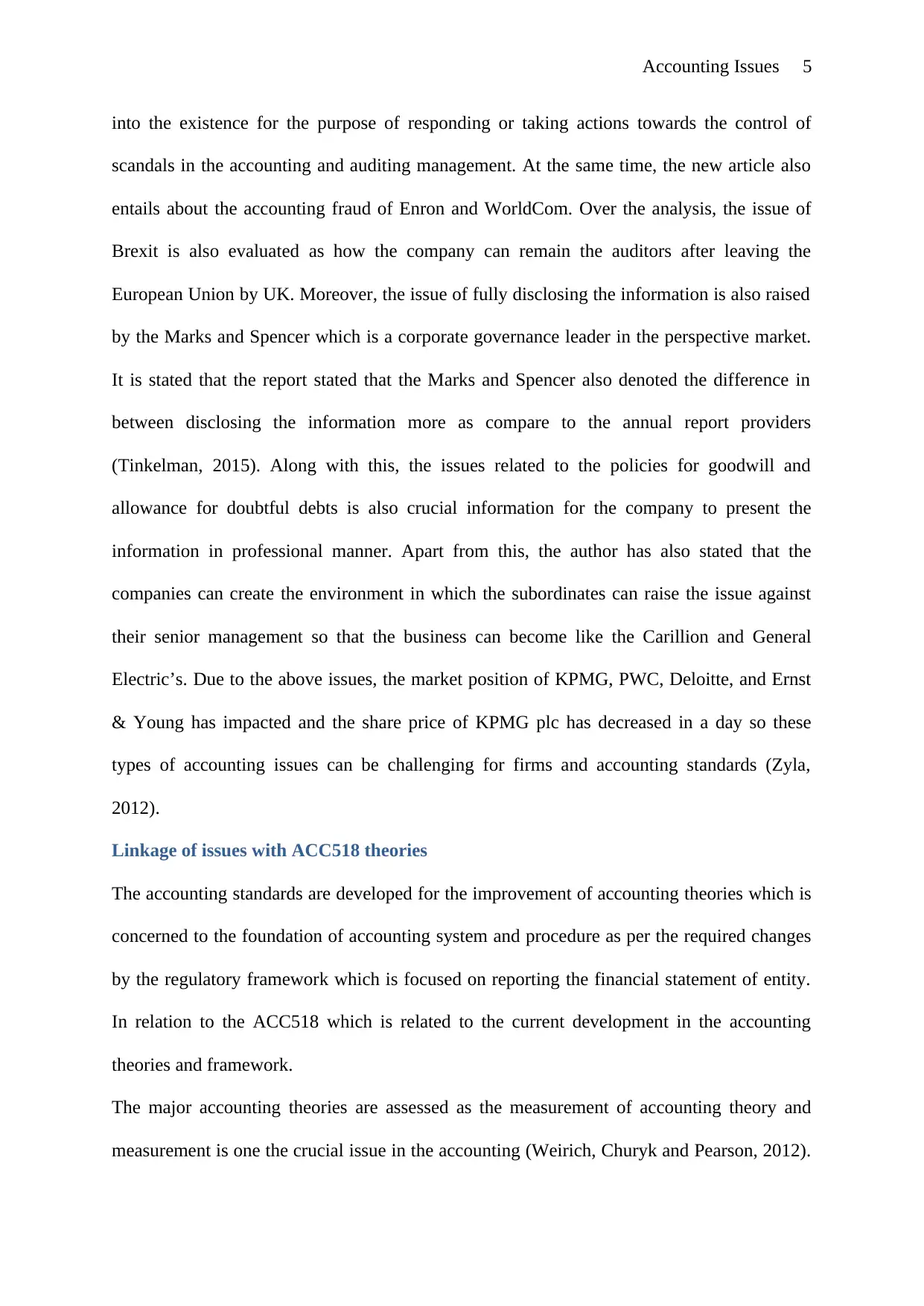
Accounting Issues 5
into the existence for the purpose of responding or taking actions towards the control of
scandals in the accounting and auditing management. At the same time, the new article also
entails about the accounting fraud of Enron and WorldCom. Over the analysis, the issue of
Brexit is also evaluated as how the company can remain the auditors after leaving the
European Union by UK. Moreover, the issue of fully disclosing the information is also raised
by the Marks and Spencer which is a corporate governance leader in the perspective market.
It is stated that the report stated that the Marks and Spencer also denoted the difference in
between disclosing the information more as compare to the annual report providers
(Tinkelman, 2015). Along with this, the issues related to the policies for goodwill and
allowance for doubtful debts is also crucial information for the company to present the
information in professional manner. Apart from this, the author has also stated that the
companies can create the environment in which the subordinates can raise the issue against
their senior management so that the business can become like the Carillion and General
Electric’s. Due to the above issues, the market position of KPMG, PWC, Deloitte, and Ernst
& Young has impacted and the share price of KPMG plc has decreased in a day so these
types of accounting issues can be challenging for firms and accounting standards (Zyla,
2012).
Linkage of issues with ACC518 theories
The accounting standards are developed for the improvement of accounting theories which is
concerned to the foundation of accounting system and procedure as per the required changes
by the regulatory framework which is focused on reporting the financial statement of entity.
In relation to the ACC518 which is related to the current development in the accounting
theories and framework.
The major accounting theories are assessed as the measurement of accounting theory and
measurement is one the crucial issue in the accounting (Weirich, Churyk and Pearson, 2012).
into the existence for the purpose of responding or taking actions towards the control of
scandals in the accounting and auditing management. At the same time, the new article also
entails about the accounting fraud of Enron and WorldCom. Over the analysis, the issue of
Brexit is also evaluated as how the company can remain the auditors after leaving the
European Union by UK. Moreover, the issue of fully disclosing the information is also raised
by the Marks and Spencer which is a corporate governance leader in the perspective market.
It is stated that the report stated that the Marks and Spencer also denoted the difference in
between disclosing the information more as compare to the annual report providers
(Tinkelman, 2015). Along with this, the issues related to the policies for goodwill and
allowance for doubtful debts is also crucial information for the company to present the
information in professional manner. Apart from this, the author has also stated that the
companies can create the environment in which the subordinates can raise the issue against
their senior management so that the business can become like the Carillion and General
Electric’s. Due to the above issues, the market position of KPMG, PWC, Deloitte, and Ernst
& Young has impacted and the share price of KPMG plc has decreased in a day so these
types of accounting issues can be challenging for firms and accounting standards (Zyla,
2012).
Linkage of issues with ACC518 theories
The accounting standards are developed for the improvement of accounting theories which is
concerned to the foundation of accounting system and procedure as per the required changes
by the regulatory framework which is focused on reporting the financial statement of entity.
In relation to the ACC518 which is related to the current development in the accounting
theories and framework.
The major accounting theories are assessed as the measurement of accounting theory and
measurement is one the crucial issue in the accounting (Weirich, Churyk and Pearson, 2012).
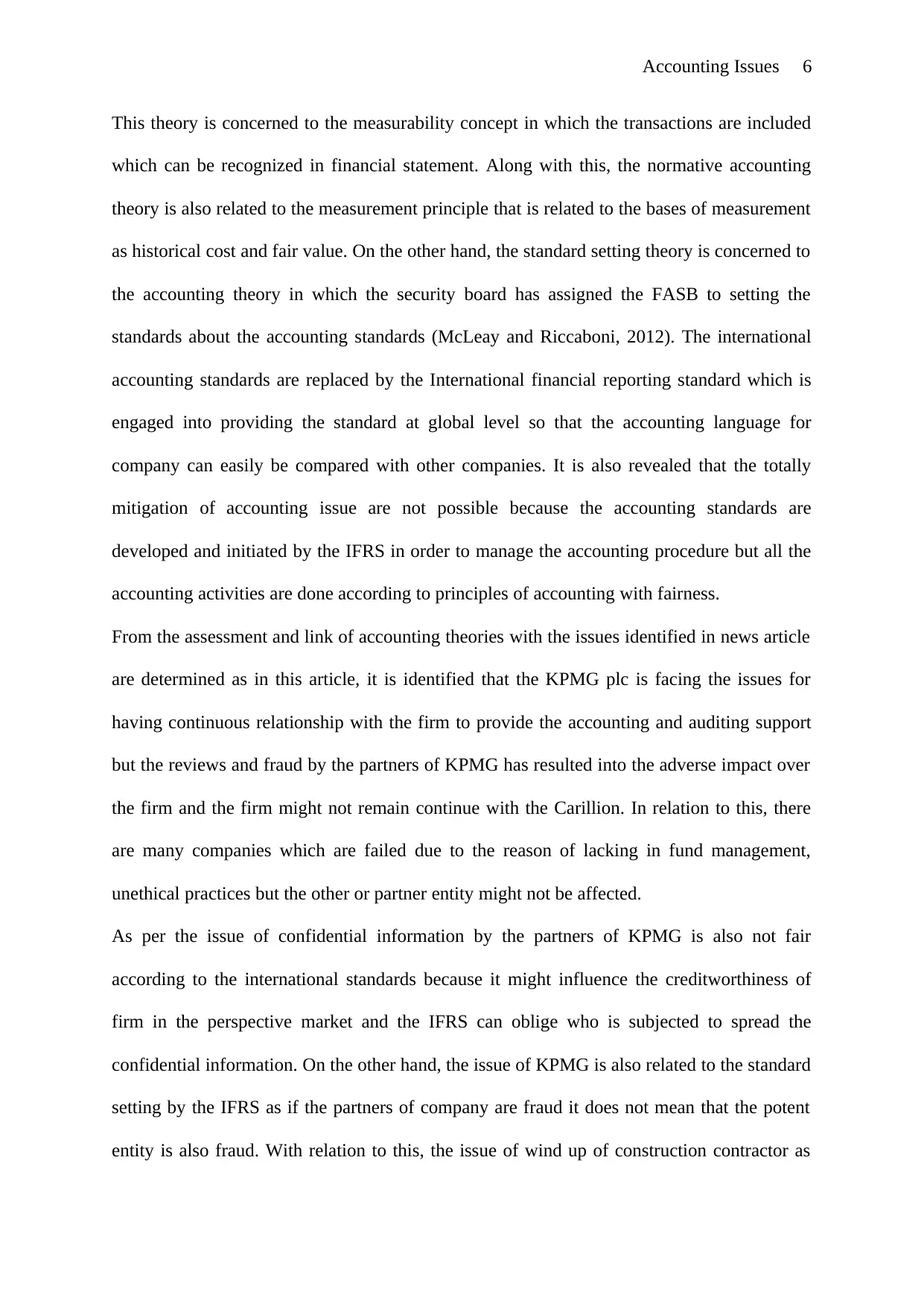
Accounting Issues 6
This theory is concerned to the measurability concept in which the transactions are included
which can be recognized in financial statement. Along with this, the normative accounting
theory is also related to the measurement principle that is related to the bases of measurement
as historical cost and fair value. On the other hand, the standard setting theory is concerned to
the accounting theory in which the security board has assigned the FASB to setting the
standards about the accounting standards (McLeay and Riccaboni, 2012). The international
accounting standards are replaced by the International financial reporting standard which is
engaged into providing the standard at global level so that the accounting language for
company can easily be compared with other companies. It is also revealed that the totally
mitigation of accounting issue are not possible because the accounting standards are
developed and initiated by the IFRS in order to manage the accounting procedure but all the
accounting activities are done according to principles of accounting with fairness.
From the assessment and link of accounting theories with the issues identified in news article
are determined as in this article, it is identified that the KPMG plc is facing the issues for
having continuous relationship with the firm to provide the accounting and auditing support
but the reviews and fraud by the partners of KPMG has resulted into the adverse impact over
the firm and the firm might not remain continue with the Carillion. In relation to this, there
are many companies which are failed due to the reason of lacking in fund management,
unethical practices but the other or partner entity might not be affected.
As per the issue of confidential information by the partners of KPMG is also not fair
according to the international standards because it might influence the creditworthiness of
firm in the perspective market and the IFRS can oblige who is subjected to spread the
confidential information. On the other hand, the issue of KPMG is also related to the standard
setting by the IFRS as if the partners of company are fraud it does not mean that the potent
entity is also fraud. With relation to this, the issue of wind up of construction contractor as
This theory is concerned to the measurability concept in which the transactions are included
which can be recognized in financial statement. Along with this, the normative accounting
theory is also related to the measurement principle that is related to the bases of measurement
as historical cost and fair value. On the other hand, the standard setting theory is concerned to
the accounting theory in which the security board has assigned the FASB to setting the
standards about the accounting standards (McLeay and Riccaboni, 2012). The international
accounting standards are replaced by the International financial reporting standard which is
engaged into providing the standard at global level so that the accounting language for
company can easily be compared with other companies. It is also revealed that the totally
mitigation of accounting issue are not possible because the accounting standards are
developed and initiated by the IFRS in order to manage the accounting procedure but all the
accounting activities are done according to principles of accounting with fairness.
From the assessment and link of accounting theories with the issues identified in news article
are determined as in this article, it is identified that the KPMG plc is facing the issues for
having continuous relationship with the firm to provide the accounting and auditing support
but the reviews and fraud by the partners of KPMG has resulted into the adverse impact over
the firm and the firm might not remain continue with the Carillion. In relation to this, there
are many companies which are failed due to the reason of lacking in fund management,
unethical practices but the other or partner entity might not be affected.
As per the issue of confidential information by the partners of KPMG is also not fair
according to the international standards because it might influence the creditworthiness of
firm in the perspective market and the IFRS can oblige who is subjected to spread the
confidential information. On the other hand, the issue of KPMG is also related to the standard
setting by the IFRS as if the partners of company are fraud it does not mean that the potent
entity is also fraud. With relation to this, the issue of wind up of construction contractor as
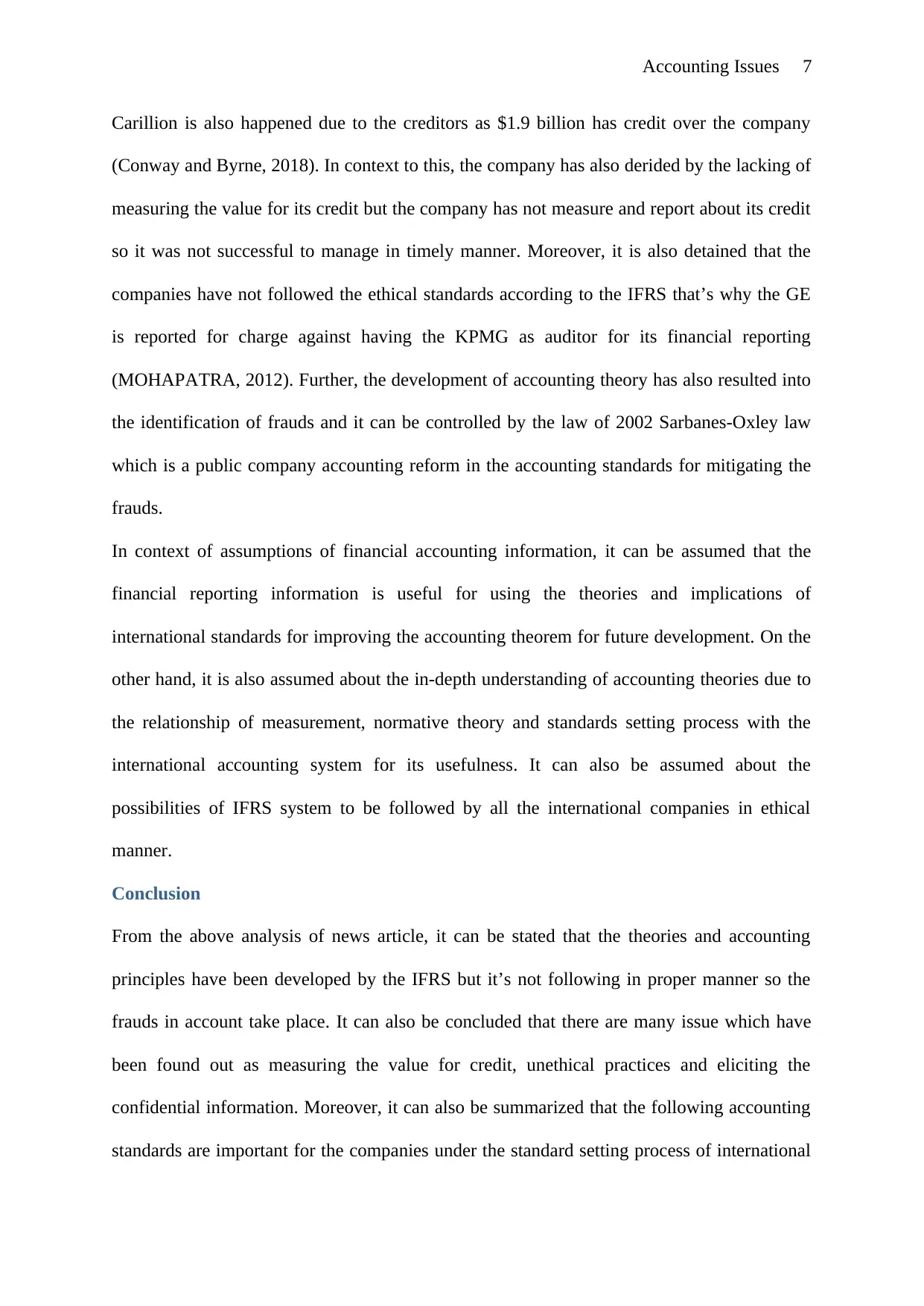
Accounting Issues 7
Carillion is also happened due to the creditors as $1.9 billion has credit over the company
(Conway and Byrne, 2018). In context to this, the company has also derided by the lacking of
measuring the value for its credit but the company has not measure and report about its credit
so it was not successful to manage in timely manner. Moreover, it is also detained that the
companies have not followed the ethical standards according to the IFRS that’s why the GE
is reported for charge against having the KPMG as auditor for its financial reporting
(MOHAPATRA, 2012). Further, the development of accounting theory has also resulted into
the identification of frauds and it can be controlled by the law of 2002 Sarbanes-Oxley law
which is a public company accounting reform in the accounting standards for mitigating the
frauds.
In context of assumptions of financial accounting information, it can be assumed that the
financial reporting information is useful for using the theories and implications of
international standards for improving the accounting theorem for future development. On the
other hand, it is also assumed about the in-depth understanding of accounting theories due to
the relationship of measurement, normative theory and standards setting process with the
international accounting system for its usefulness. It can also be assumed about the
possibilities of IFRS system to be followed by all the international companies in ethical
manner.
Conclusion
From the above analysis of news article, it can be stated that the theories and accounting
principles have been developed by the IFRS but it’s not following in proper manner so the
frauds in account take place. It can also be concluded that there are many issue which have
been found out as measuring the value for credit, unethical practices and eliciting the
confidential information. Moreover, it can also be summarized that the following accounting
standards are important for the companies under the standard setting process of international
Carillion is also happened due to the creditors as $1.9 billion has credit over the company
(Conway and Byrne, 2018). In context to this, the company has also derided by the lacking of
measuring the value for its credit but the company has not measure and report about its credit
so it was not successful to manage in timely manner. Moreover, it is also detained that the
companies have not followed the ethical standards according to the IFRS that’s why the GE
is reported for charge against having the KPMG as auditor for its financial reporting
(MOHAPATRA, 2012). Further, the development of accounting theory has also resulted into
the identification of frauds and it can be controlled by the law of 2002 Sarbanes-Oxley law
which is a public company accounting reform in the accounting standards for mitigating the
frauds.
In context of assumptions of financial accounting information, it can be assumed that the
financial reporting information is useful for using the theories and implications of
international standards for improving the accounting theorem for future development. On the
other hand, it is also assumed about the in-depth understanding of accounting theories due to
the relationship of measurement, normative theory and standards setting process with the
international accounting system for its usefulness. It can also be assumed about the
possibilities of IFRS system to be followed by all the international companies in ethical
manner.
Conclusion
From the above analysis of news article, it can be stated that the theories and accounting
principles have been developed by the IFRS but it’s not following in proper manner so the
frauds in account take place. It can also be concluded that there are many issue which have
been found out as measuring the value for credit, unethical practices and eliciting the
confidential information. Moreover, it can also be summarized that the following accounting
standards are important for the companies under the standard setting process of international
Paraphrase This Document
Need a fresh take? Get an instant paraphrase of this document with our AI Paraphraser
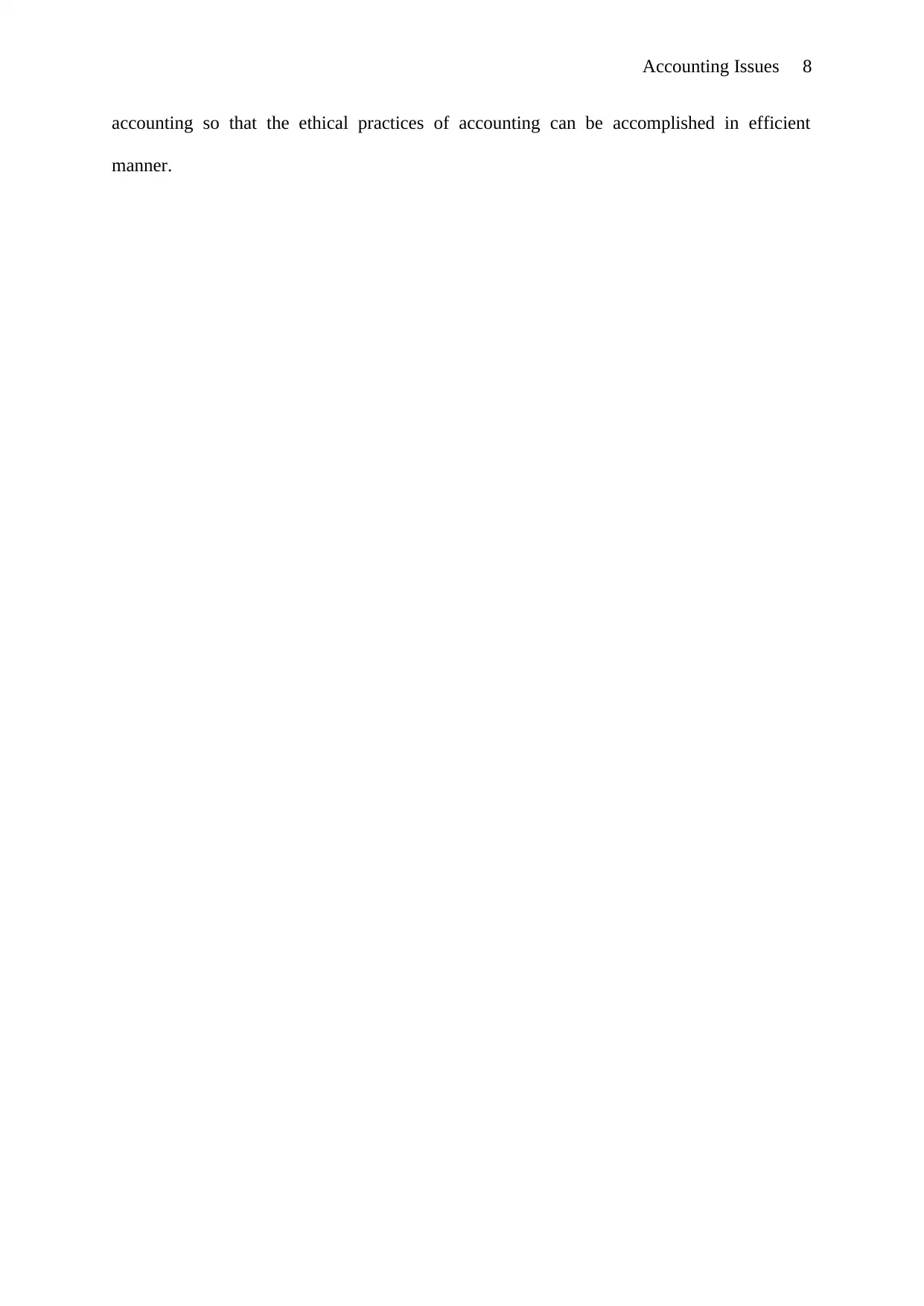
Accounting Issues 8
accounting so that the ethical practices of accounting can be accomplished in efficient
manner.
accounting so that the ethical practices of accounting can be accomplished in efficient
manner.
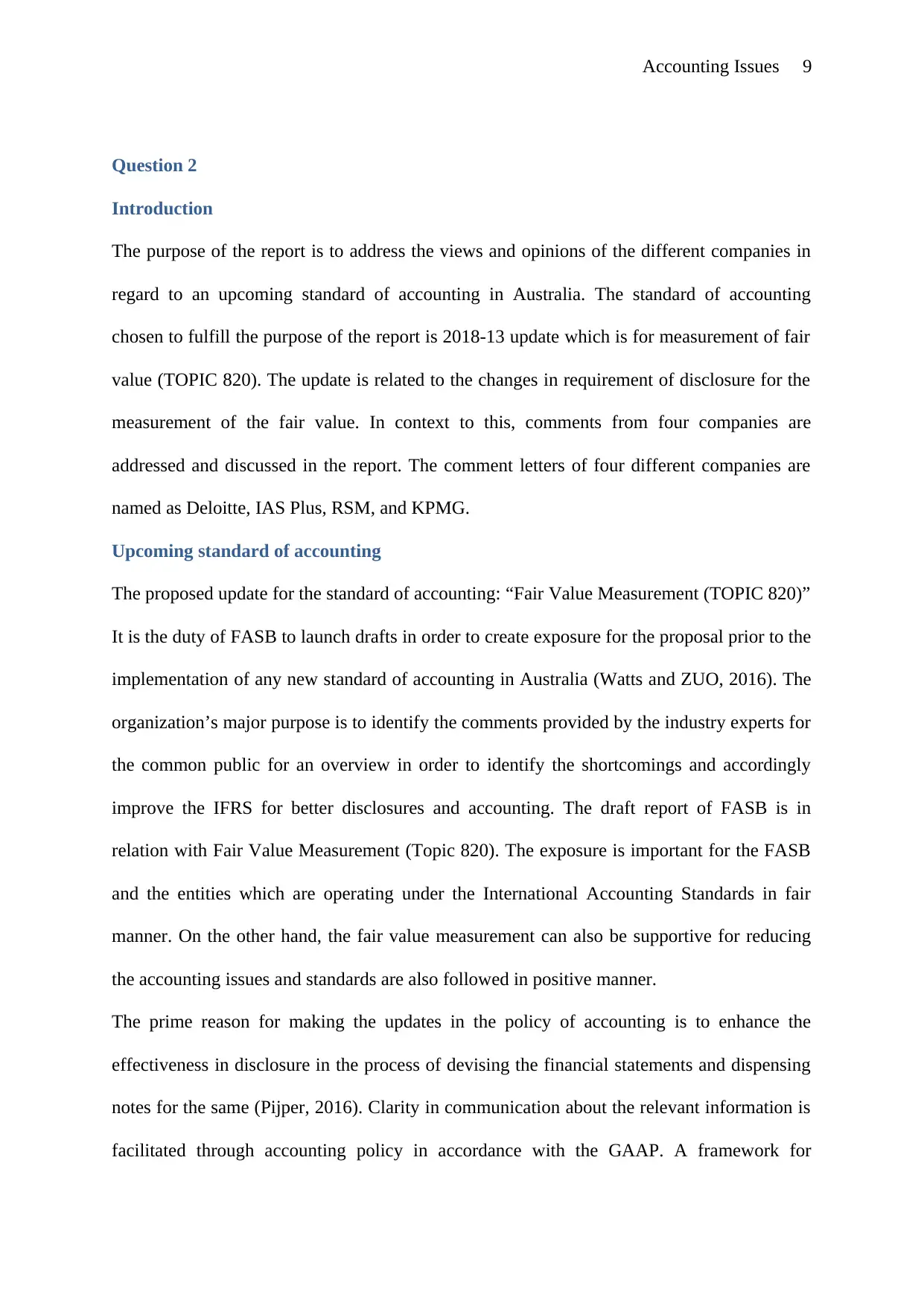
Accounting Issues 9
Question 2
Introduction
The purpose of the report is to address the views and opinions of the different companies in
regard to an upcoming standard of accounting in Australia. The standard of accounting
chosen to fulfill the purpose of the report is 2018-13 update which is for measurement of fair
value (TOPIC 820). The update is related to the changes in requirement of disclosure for the
measurement of the fair value. In context to this, comments from four companies are
addressed and discussed in the report. The comment letters of four different companies are
named as Deloitte, IAS Plus, RSM, and KPMG.
Upcoming standard of accounting
The proposed update for the standard of accounting: “Fair Value Measurement (TOPIC 820)”
It is the duty of FASB to launch drafts in order to create exposure for the proposal prior to the
implementation of any new standard of accounting in Australia (Watts and ZUO, 2016). The
organization’s major purpose is to identify the comments provided by the industry experts for
the common public for an overview in order to identify the shortcomings and accordingly
improve the IFRS for better disclosures and accounting. The draft report of FASB is in
relation with Fair Value Measurement (Topic 820). The exposure is important for the FASB
and the entities which are operating under the International Accounting Standards in fair
manner. On the other hand, the fair value measurement can also be supportive for reducing
the accounting issues and standards are also followed in positive manner.
The prime reason for making the updates in the policy of accounting is to enhance the
effectiveness in disclosure in the process of devising the financial statements and dispensing
notes for the same (Pijper, 2016). Clarity in communication about the relevant information is
facilitated through accounting policy in accordance with the GAAP. A framework for
Question 2
Introduction
The purpose of the report is to address the views and opinions of the different companies in
regard to an upcoming standard of accounting in Australia. The standard of accounting
chosen to fulfill the purpose of the report is 2018-13 update which is for measurement of fair
value (TOPIC 820). The update is related to the changes in requirement of disclosure for the
measurement of the fair value. In context to this, comments from four companies are
addressed and discussed in the report. The comment letters of four different companies are
named as Deloitte, IAS Plus, RSM, and KPMG.
Upcoming standard of accounting
The proposed update for the standard of accounting: “Fair Value Measurement (TOPIC 820)”
It is the duty of FASB to launch drafts in order to create exposure for the proposal prior to the
implementation of any new standard of accounting in Australia (Watts and ZUO, 2016). The
organization’s major purpose is to identify the comments provided by the industry experts for
the common public for an overview in order to identify the shortcomings and accordingly
improve the IFRS for better disclosures and accounting. The draft report of FASB is in
relation with Fair Value Measurement (Topic 820). The exposure is important for the FASB
and the entities which are operating under the International Accounting Standards in fair
manner. On the other hand, the fair value measurement can also be supportive for reducing
the accounting issues and standards are also followed in positive manner.
The prime reason for making the updates in the policy of accounting is to enhance the
effectiveness in disclosure in the process of devising the financial statements and dispensing
notes for the same (Pijper, 2016). Clarity in communication about the relevant information is
facilitated through accounting policy in accordance with the GAAP. A framework for
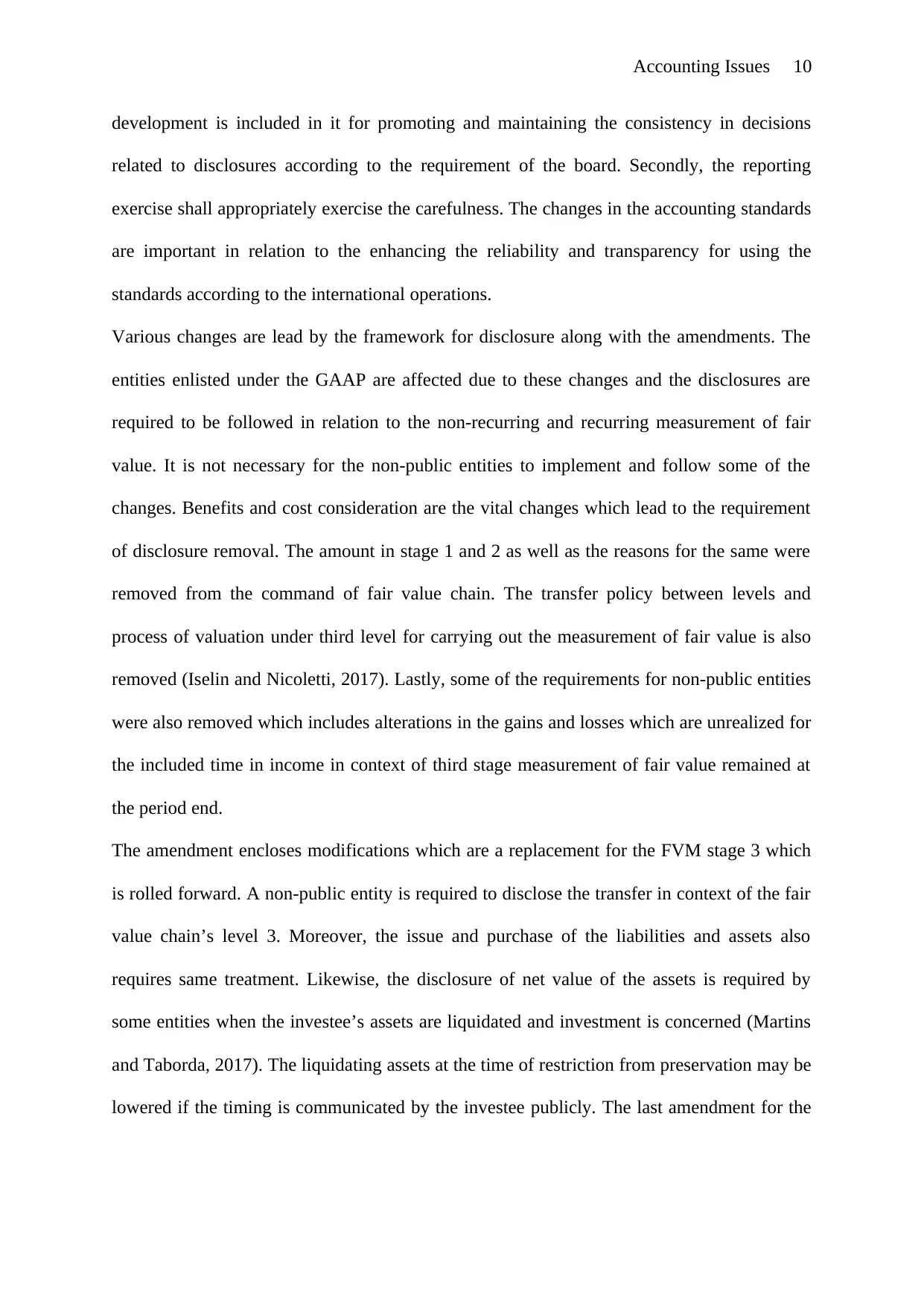
Accounting Issues 10
development is included in it for promoting and maintaining the consistency in decisions
related to disclosures according to the requirement of the board. Secondly, the reporting
exercise shall appropriately exercise the carefulness. The changes in the accounting standards
are important in relation to the enhancing the reliability and transparency for using the
standards according to the international operations.
Various changes are lead by the framework for disclosure along with the amendments. The
entities enlisted under the GAAP are affected due to these changes and the disclosures are
required to be followed in relation to the non-recurring and recurring measurement of fair
value. It is not necessary for the non-public entities to implement and follow some of the
changes. Benefits and cost consideration are the vital changes which lead to the requirement
of disclosure removal. The amount in stage 1 and 2 as well as the reasons for the same were
removed from the command of fair value chain. The transfer policy between levels and
process of valuation under third level for carrying out the measurement of fair value is also
removed (Iselin and Nicoletti, 2017). Lastly, some of the requirements for non-public entities
were also removed which includes alterations in the gains and losses which are unrealized for
the included time in income in context of third stage measurement of fair value remained at
the period end.
The amendment encloses modifications which are a replacement for the FVM stage 3 which
is rolled forward. A non-public entity is required to disclose the transfer in context of the fair
value chain’s level 3. Moreover, the issue and purchase of the liabilities and assets also
requires same treatment. Likewise, the disclosure of net value of the assets is required by
some entities when the investee’s assets are liquidated and investment is concerned (Martins
and Taborda, 2017). The liquidating assets at the time of restriction from preservation may be
lowered if the timing is communicated by the investee publicly. The last amendment for the
development is included in it for promoting and maintaining the consistency in decisions
related to disclosures according to the requirement of the board. Secondly, the reporting
exercise shall appropriately exercise the carefulness. The changes in the accounting standards
are important in relation to the enhancing the reliability and transparency for using the
standards according to the international operations.
Various changes are lead by the framework for disclosure along with the amendments. The
entities enlisted under the GAAP are affected due to these changes and the disclosures are
required to be followed in relation to the non-recurring and recurring measurement of fair
value. It is not necessary for the non-public entities to implement and follow some of the
changes. Benefits and cost consideration are the vital changes which lead to the requirement
of disclosure removal. The amount in stage 1 and 2 as well as the reasons for the same were
removed from the command of fair value chain. The transfer policy between levels and
process of valuation under third level for carrying out the measurement of fair value is also
removed (Iselin and Nicoletti, 2017). Lastly, some of the requirements for non-public entities
were also removed which includes alterations in the gains and losses which are unrealized for
the included time in income in context of third stage measurement of fair value remained at
the period end.
The amendment encloses modifications which are a replacement for the FVM stage 3 which
is rolled forward. A non-public entity is required to disclose the transfer in context of the fair
value chain’s level 3. Moreover, the issue and purchase of the liabilities and assets also
requires same treatment. Likewise, the disclosure of net value of the assets is required by
some entities when the investee’s assets are liquidated and investment is concerned (Martins
and Taborda, 2017). The liquidating assets at the time of restriction from preservation may be
lowered if the timing is communicated by the investee publicly. The last amendment for the
Secure Best Marks with AI Grader
Need help grading? Try our AI Grader for instant feedback on your assignments.
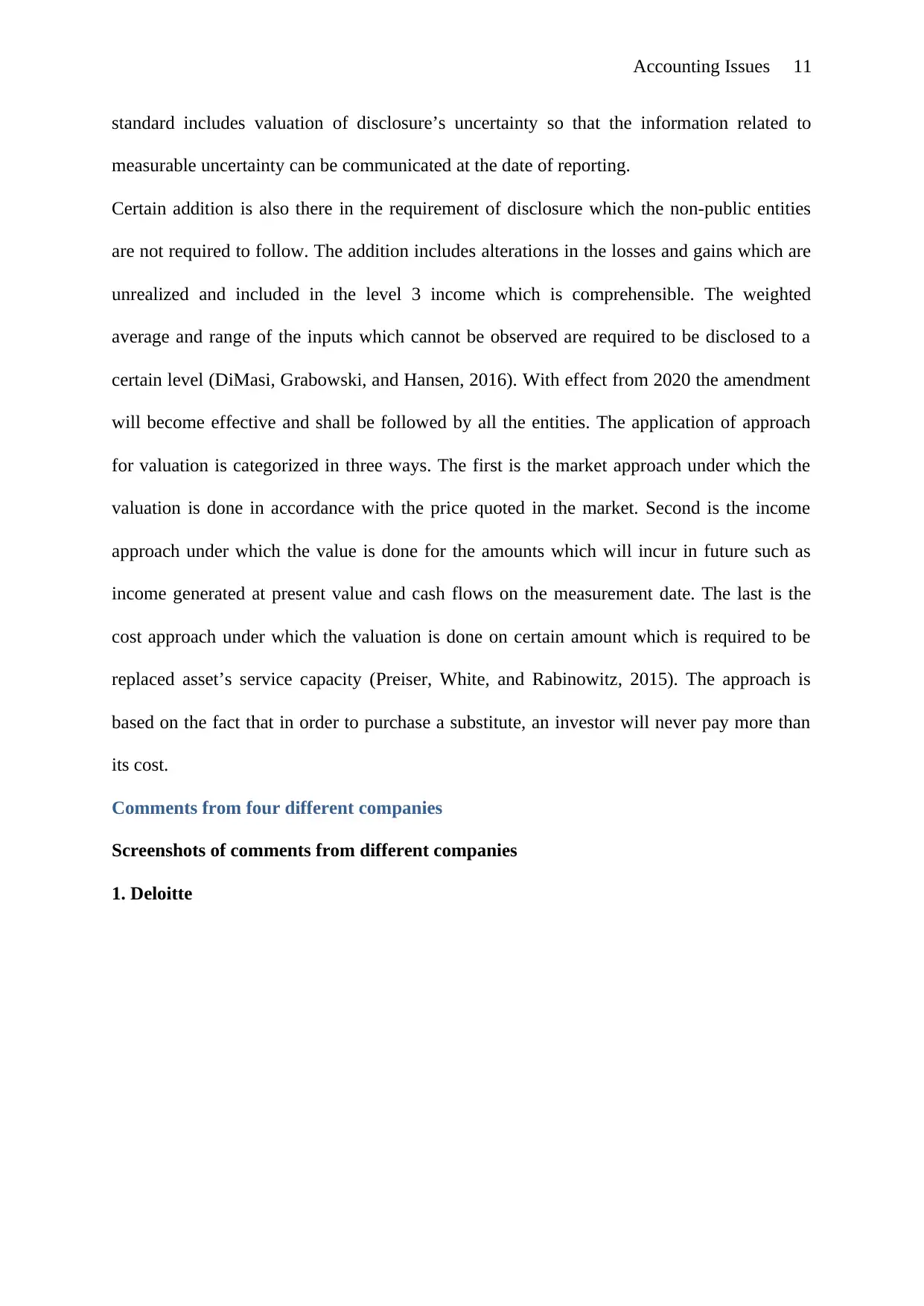
Accounting Issues 11
standard includes valuation of disclosure’s uncertainty so that the information related to
measurable uncertainty can be communicated at the date of reporting.
Certain addition is also there in the requirement of disclosure which the non-public entities
are not required to follow. The addition includes alterations in the losses and gains which are
unrealized and included in the level 3 income which is comprehensible. The weighted
average and range of the inputs which cannot be observed are required to be disclosed to a
certain level (DiMasi, Grabowski, and Hansen, 2016). With effect from 2020 the amendment
will become effective and shall be followed by all the entities. The application of approach
for valuation is categorized in three ways. The first is the market approach under which the
valuation is done in accordance with the price quoted in the market. Second is the income
approach under which the value is done for the amounts which will incur in future such as
income generated at present value and cash flows on the measurement date. The last is the
cost approach under which the valuation is done on certain amount which is required to be
replaced asset’s service capacity (Preiser, White, and Rabinowitz, 2015). The approach is
based on the fact that in order to purchase a substitute, an investor will never pay more than
its cost.
Comments from four different companies
Screenshots of comments from different companies
1. Deloitte
standard includes valuation of disclosure’s uncertainty so that the information related to
measurable uncertainty can be communicated at the date of reporting.
Certain addition is also there in the requirement of disclosure which the non-public entities
are not required to follow. The addition includes alterations in the losses and gains which are
unrealized and included in the level 3 income which is comprehensible. The weighted
average and range of the inputs which cannot be observed are required to be disclosed to a
certain level (DiMasi, Grabowski, and Hansen, 2016). With effect from 2020 the amendment
will become effective and shall be followed by all the entities. The application of approach
for valuation is categorized in three ways. The first is the market approach under which the
valuation is done in accordance with the price quoted in the market. Second is the income
approach under which the value is done for the amounts which will incur in future such as
income generated at present value and cash flows on the measurement date. The last is the
cost approach under which the valuation is done on certain amount which is required to be
replaced asset’s service capacity (Preiser, White, and Rabinowitz, 2015). The approach is
based on the fact that in order to purchase a substitute, an investor will never pay more than
its cost.
Comments from four different companies
Screenshots of comments from different companies
1. Deloitte
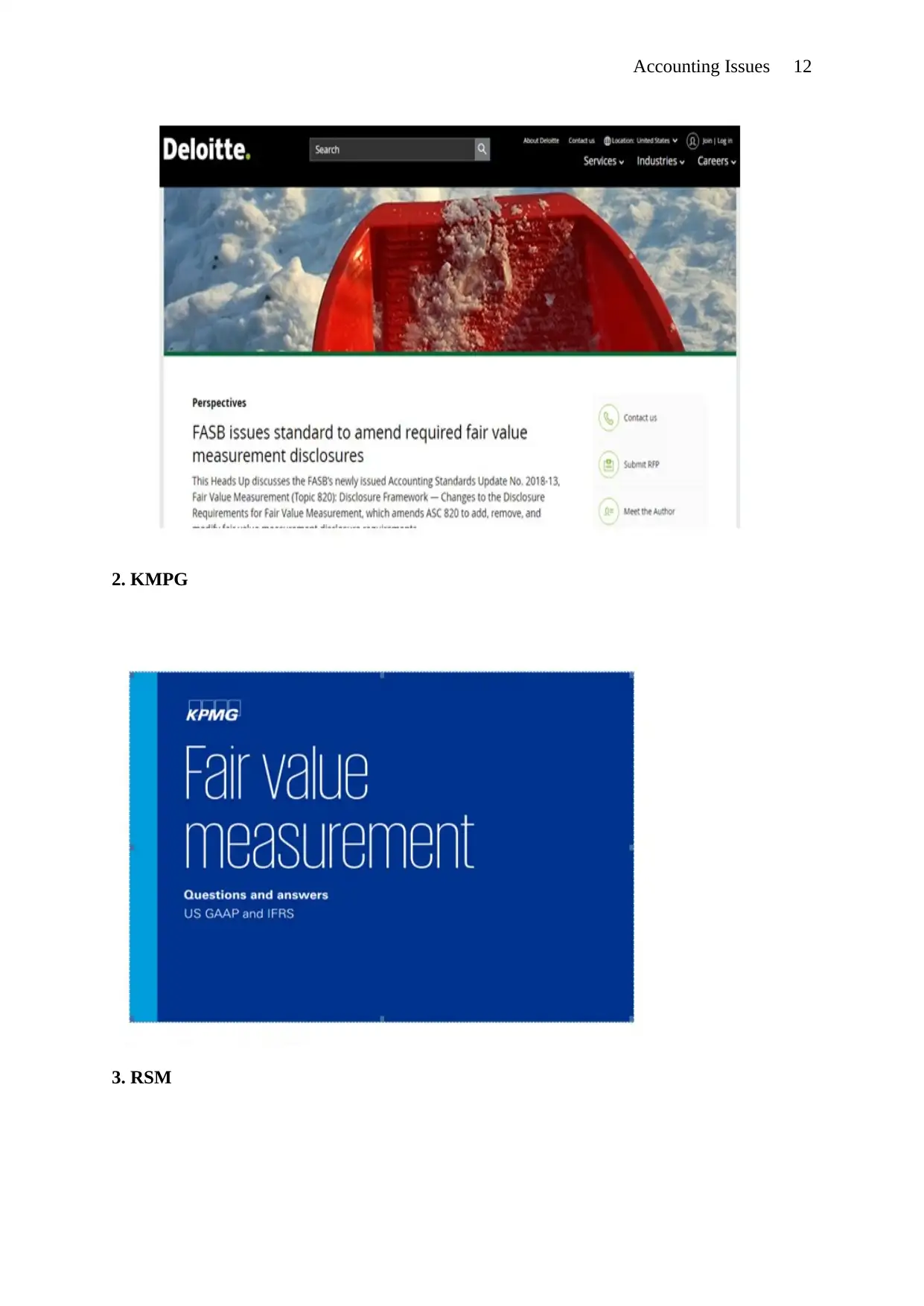
Accounting Issues 12
2. KMPG
3. RSM
2. KMPG
3. RSM
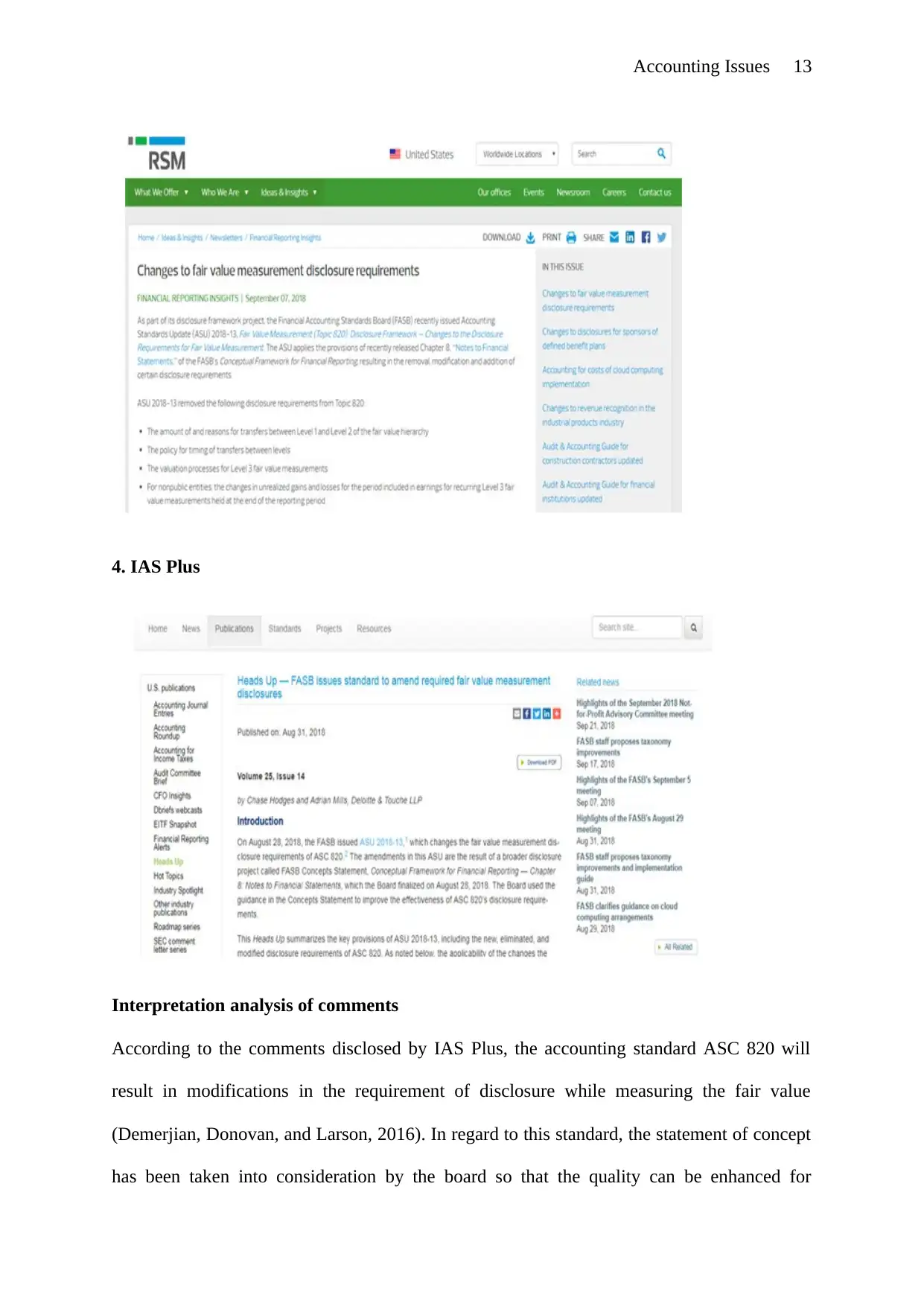
Accounting Issues 13
4. IAS Plus
Interpretation analysis of comments
According to the comments disclosed by IAS Plus, the accounting standard ASC 820 will
result in modifications in the requirement of disclosure while measuring the fair value
(Demerjian, Donovan, and Larson, 2016). In regard to this standard, the statement of concept
has been taken into consideration by the board so that the quality can be enhanced for
4. IAS Plus
Interpretation analysis of comments
According to the comments disclosed by IAS Plus, the accounting standard ASC 820 will
result in modifications in the requirement of disclosure while measuring the fair value
(Demerjian, Donovan, and Larson, 2016). In regard to this standard, the statement of concept
has been taken into consideration by the board so that the quality can be enhanced for
Paraphrase This Document
Need a fresh take? Get an instant paraphrase of this document with our AI Paraphraser
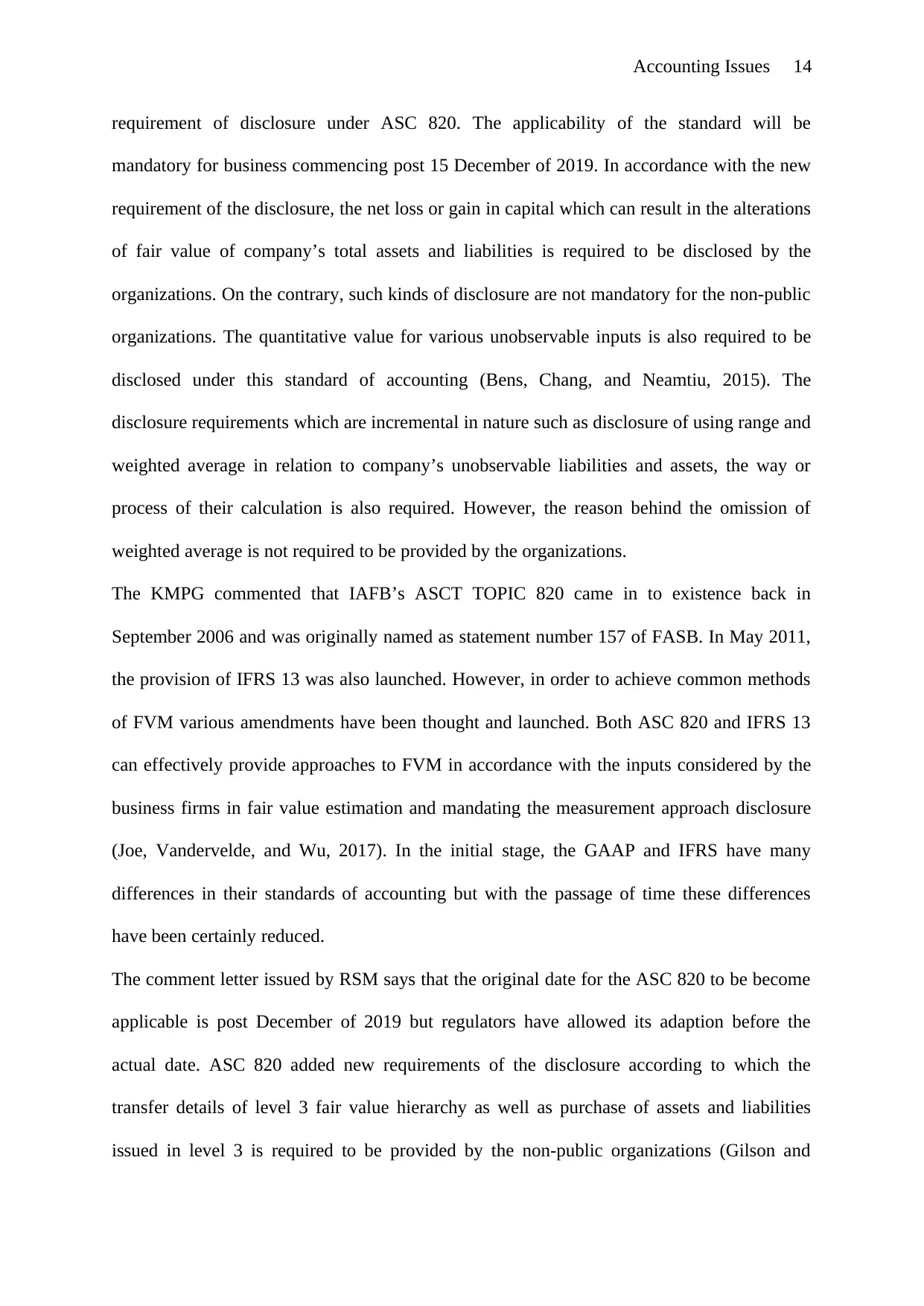
Accounting Issues 14
requirement of disclosure under ASC 820. The applicability of the standard will be
mandatory for business commencing post 15 December of 2019. In accordance with the new
requirement of the disclosure, the net loss or gain in capital which can result in the alterations
of fair value of company’s total assets and liabilities is required to be disclosed by the
organizations. On the contrary, such kinds of disclosure are not mandatory for the non-public
organizations. The quantitative value for various unobservable inputs is also required to be
disclosed under this standard of accounting (Bens, Chang, and Neamtiu, 2015). The
disclosure requirements which are incremental in nature such as disclosure of using range and
weighted average in relation to company’s unobservable liabilities and assets, the way or
process of their calculation is also required. However, the reason behind the omission of
weighted average is not required to be provided by the organizations.
The KMPG commented that IAFB’s ASCT TOPIC 820 came in to existence back in
September 2006 and was originally named as statement number 157 of FASB. In May 2011,
the provision of IFRS 13 was also launched. However, in order to achieve common methods
of FVM various amendments have been thought and launched. Both ASC 820 and IFRS 13
can effectively provide approaches to FVM in accordance with the inputs considered by the
business firms in fair value estimation and mandating the measurement approach disclosure
(Joe, Vandervelde, and Wu, 2017). In the initial stage, the GAAP and IFRS have many
differences in their standards of accounting but with the passage of time these differences
have been certainly reduced.
The comment letter issued by RSM says that the original date for the ASC 820 to be become
applicable is post December of 2019 but regulators have allowed its adaption before the
actual date. ASC 820 added new requirements of the disclosure according to which the
transfer details of level 3 fair value hierarchy as well as purchase of assets and liabilities
issued in level 3 is required to be provided by the non-public organizations (Gilson and
requirement of disclosure under ASC 820. The applicability of the standard will be
mandatory for business commencing post 15 December of 2019. In accordance with the new
requirement of the disclosure, the net loss or gain in capital which can result in the alterations
of fair value of company’s total assets and liabilities is required to be disclosed by the
organizations. On the contrary, such kinds of disclosure are not mandatory for the non-public
organizations. The quantitative value for various unobservable inputs is also required to be
disclosed under this standard of accounting (Bens, Chang, and Neamtiu, 2015). The
disclosure requirements which are incremental in nature such as disclosure of using range and
weighted average in relation to company’s unobservable liabilities and assets, the way or
process of their calculation is also required. However, the reason behind the omission of
weighted average is not required to be provided by the organizations.
The KMPG commented that IAFB’s ASCT TOPIC 820 came in to existence back in
September 2006 and was originally named as statement number 157 of FASB. In May 2011,
the provision of IFRS 13 was also launched. However, in order to achieve common methods
of FVM various amendments have been thought and launched. Both ASC 820 and IFRS 13
can effectively provide approaches to FVM in accordance with the inputs considered by the
business firms in fair value estimation and mandating the measurement approach disclosure
(Joe, Vandervelde, and Wu, 2017). In the initial stage, the GAAP and IFRS have many
differences in their standards of accounting but with the passage of time these differences
have been certainly reduced.
The comment letter issued by RSM says that the original date for the ASC 820 to be become
applicable is post December of 2019 but regulators have allowed its adaption before the
actual date. ASC 820 added new requirements of the disclosure according to which the
transfer details of level 3 fair value hierarchy as well as purchase of assets and liabilities
issued in level 3 is required to be provided by the non-public organizations (Gilson and
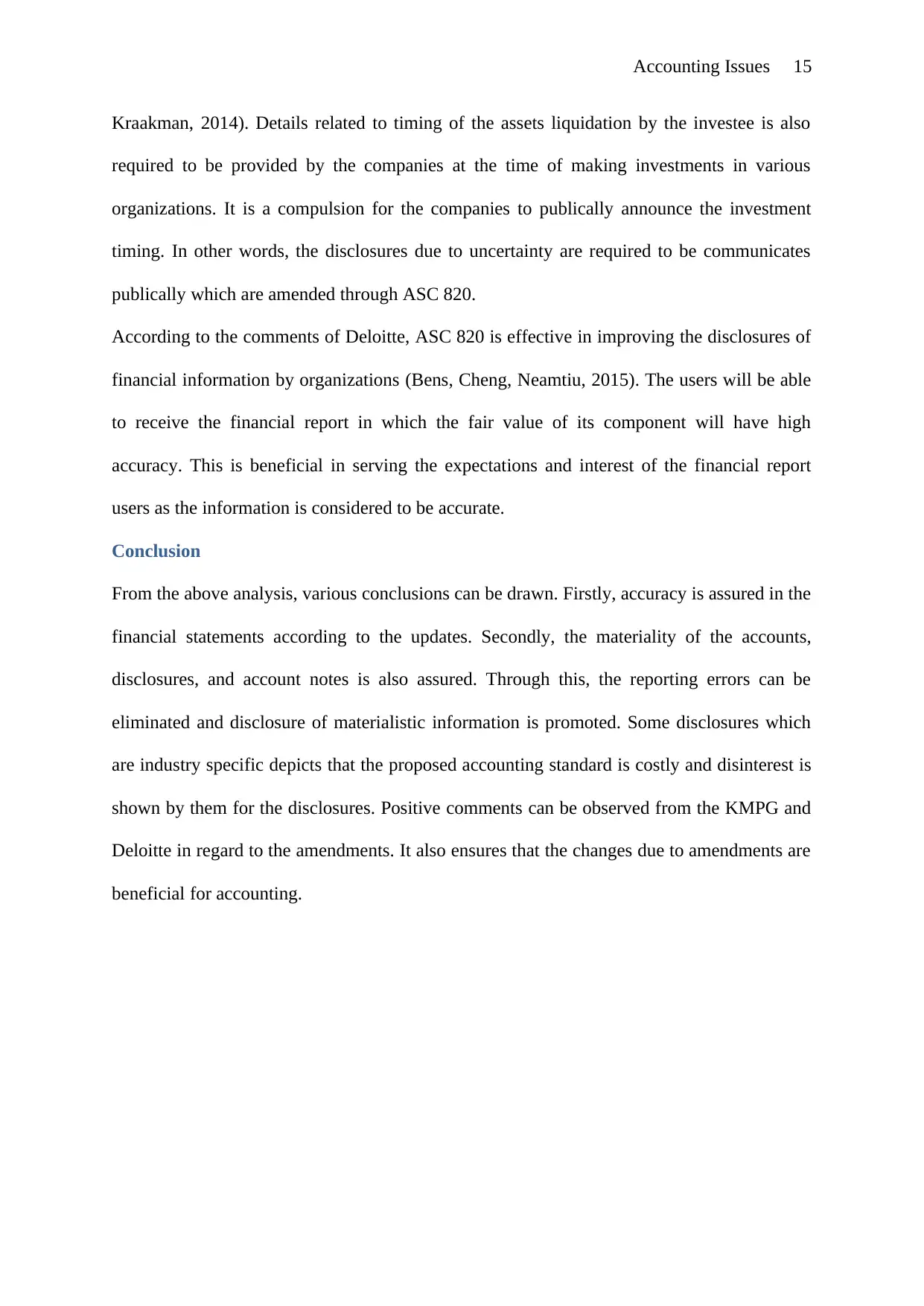
Accounting Issues 15
Kraakman, 2014). Details related to timing of the assets liquidation by the investee is also
required to be provided by the companies at the time of making investments in various
organizations. It is a compulsion for the companies to publically announce the investment
timing. In other words, the disclosures due to uncertainty are required to be communicates
publically which are amended through ASC 820.
According to the comments of Deloitte, ASC 820 is effective in improving the disclosures of
financial information by organizations (Bens, Cheng, Neamtiu, 2015). The users will be able
to receive the financial report in which the fair value of its component will have high
accuracy. This is beneficial in serving the expectations and interest of the financial report
users as the information is considered to be accurate.
Conclusion
From the above analysis, various conclusions can be drawn. Firstly, accuracy is assured in the
financial statements according to the updates. Secondly, the materiality of the accounts,
disclosures, and account notes is also assured. Through this, the reporting errors can be
eliminated and disclosure of materialistic information is promoted. Some disclosures which
are industry specific depicts that the proposed accounting standard is costly and disinterest is
shown by them for the disclosures. Positive comments can be observed from the KMPG and
Deloitte in regard to the amendments. It also ensures that the changes due to amendments are
beneficial for accounting.
Kraakman, 2014). Details related to timing of the assets liquidation by the investee is also
required to be provided by the companies at the time of making investments in various
organizations. It is a compulsion for the companies to publically announce the investment
timing. In other words, the disclosures due to uncertainty are required to be communicates
publically which are amended through ASC 820.
According to the comments of Deloitte, ASC 820 is effective in improving the disclosures of
financial information by organizations (Bens, Cheng, Neamtiu, 2015). The users will be able
to receive the financial report in which the fair value of its component will have high
accuracy. This is beneficial in serving the expectations and interest of the financial report
users as the information is considered to be accurate.
Conclusion
From the above analysis, various conclusions can be drawn. Firstly, accuracy is assured in the
financial statements according to the updates. Secondly, the materiality of the accounts,
disclosures, and account notes is also assured. Through this, the reporting errors can be
eliminated and disclosure of materialistic information is promoted. Some disclosures which
are industry specific depicts that the proposed accounting standard is costly and disinterest is
shown by them for the disclosures. Positive comments can be observed from the KMPG and
Deloitte in regard to the amendments. It also ensures that the changes due to amendments are
beneficial for accounting.
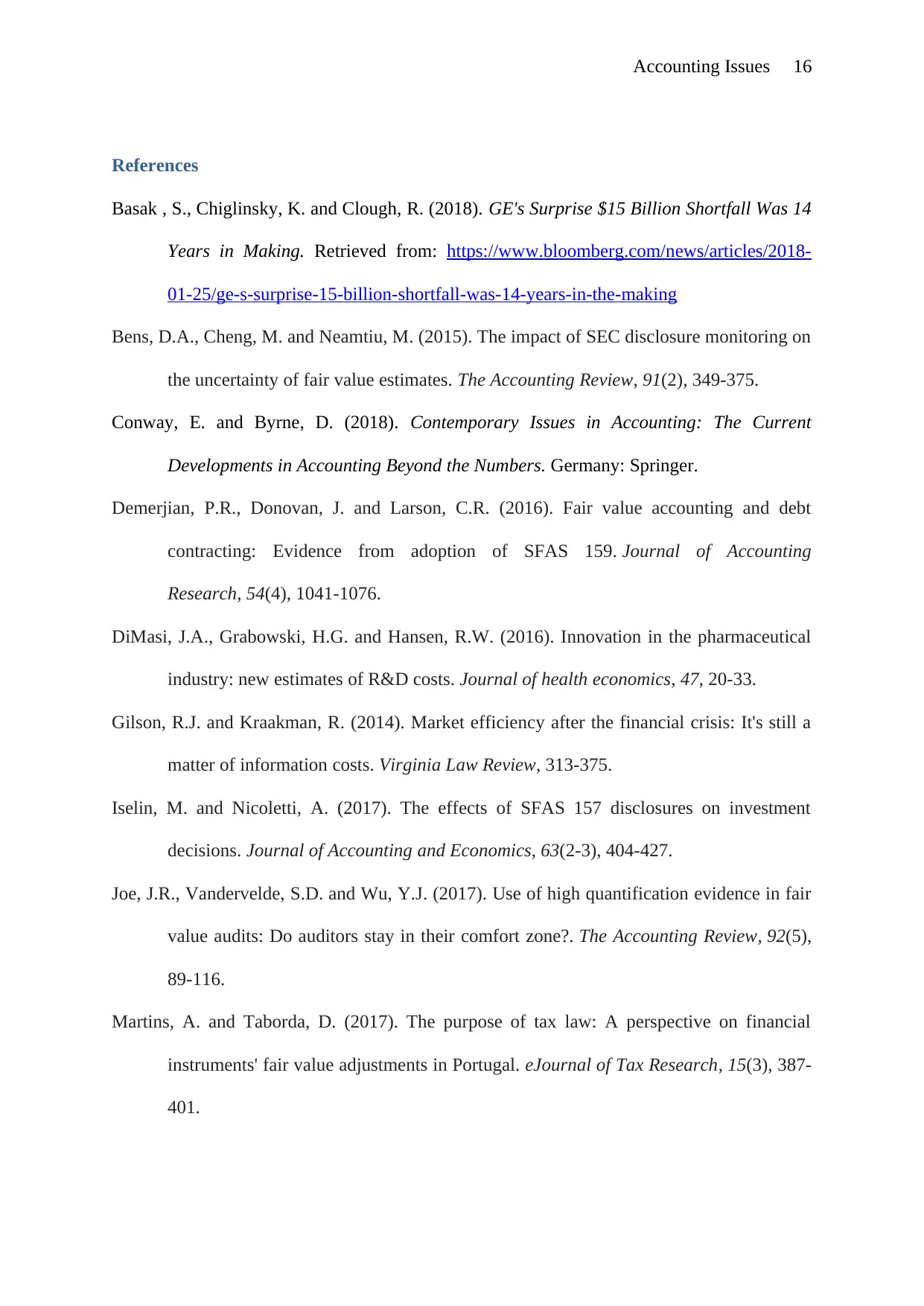
Accounting Issues 16
References
Basak , S., Chiglinsky, K. and Clough, R. (2018). GE's Surprise $15 Billion Shortfall Was 14
Years in Making. Retrieved from: https://www.bloomberg.com/news/articles/2018-
01-25/ge-s-surprise-15-billion-shortfall-was-14-years-in-the-making
Bens, D.A., Cheng, M. and Neamtiu, M. (2015). The impact of SEC disclosure monitoring on
the uncertainty of fair value estimates. The Accounting Review, 91(2), 349-375.
Conway, E. and Byrne, D. (2018). Contemporary Issues in Accounting: The Current
Developments in Accounting Beyond the Numbers. Germany: Springer.
Demerjian, P.R., Donovan, J. and Larson, C.R. (2016). Fair value accounting and debt
contracting: Evidence from adoption of SFAS 159. Journal of Accounting
Research, 54(4), 1041-1076.
DiMasi, J.A., Grabowski, H.G. and Hansen, R.W. (2016). Innovation in the pharmaceutical
industry: new estimates of R&D costs. Journal of health economics, 47, 20-33.
Gilson, R.J. and Kraakman, R. (2014). Market efficiency after the financial crisis: It's still a
matter of information costs. Virginia Law Review, 313-375.
Iselin, M. and Nicoletti, A. (2017). The effects of SFAS 157 disclosures on investment
decisions. Journal of Accounting and Economics, 63(2-3), 404-427.
Joe, J.R., Vandervelde, S.D. and Wu, Y.J. (2017). Use of high quantification evidence in fair
value audits: Do auditors stay in their comfort zone?. The Accounting Review, 92(5),
89-116.
Martins, A. and Taborda, D. (2017). The purpose of tax law: A perspective on financial
instruments' fair value adjustments in Portugal. eJournal of Tax Research, 15(3), 387-
401.
References
Basak , S., Chiglinsky, K. and Clough, R. (2018). GE's Surprise $15 Billion Shortfall Was 14
Years in Making. Retrieved from: https://www.bloomberg.com/news/articles/2018-
01-25/ge-s-surprise-15-billion-shortfall-was-14-years-in-the-making
Bens, D.A., Cheng, M. and Neamtiu, M. (2015). The impact of SEC disclosure monitoring on
the uncertainty of fair value estimates. The Accounting Review, 91(2), 349-375.
Conway, E. and Byrne, D. (2018). Contemporary Issues in Accounting: The Current
Developments in Accounting Beyond the Numbers. Germany: Springer.
Demerjian, P.R., Donovan, J. and Larson, C.R. (2016). Fair value accounting and debt
contracting: Evidence from adoption of SFAS 159. Journal of Accounting
Research, 54(4), 1041-1076.
DiMasi, J.A., Grabowski, H.G. and Hansen, R.W. (2016). Innovation in the pharmaceutical
industry: new estimates of R&D costs. Journal of health economics, 47, 20-33.
Gilson, R.J. and Kraakman, R. (2014). Market efficiency after the financial crisis: It's still a
matter of information costs. Virginia Law Review, 313-375.
Iselin, M. and Nicoletti, A. (2017). The effects of SFAS 157 disclosures on investment
decisions. Journal of Accounting and Economics, 63(2-3), 404-427.
Joe, J.R., Vandervelde, S.D. and Wu, Y.J. (2017). Use of high quantification evidence in fair
value audits: Do auditors stay in their comfort zone?. The Accounting Review, 92(5),
89-116.
Martins, A. and Taborda, D. (2017). The purpose of tax law: A perspective on financial
instruments' fair value adjustments in Portugal. eJournal of Tax Research, 15(3), 387-
401.
Secure Best Marks with AI Grader
Need help grading? Try our AI Grader for instant feedback on your assignments.
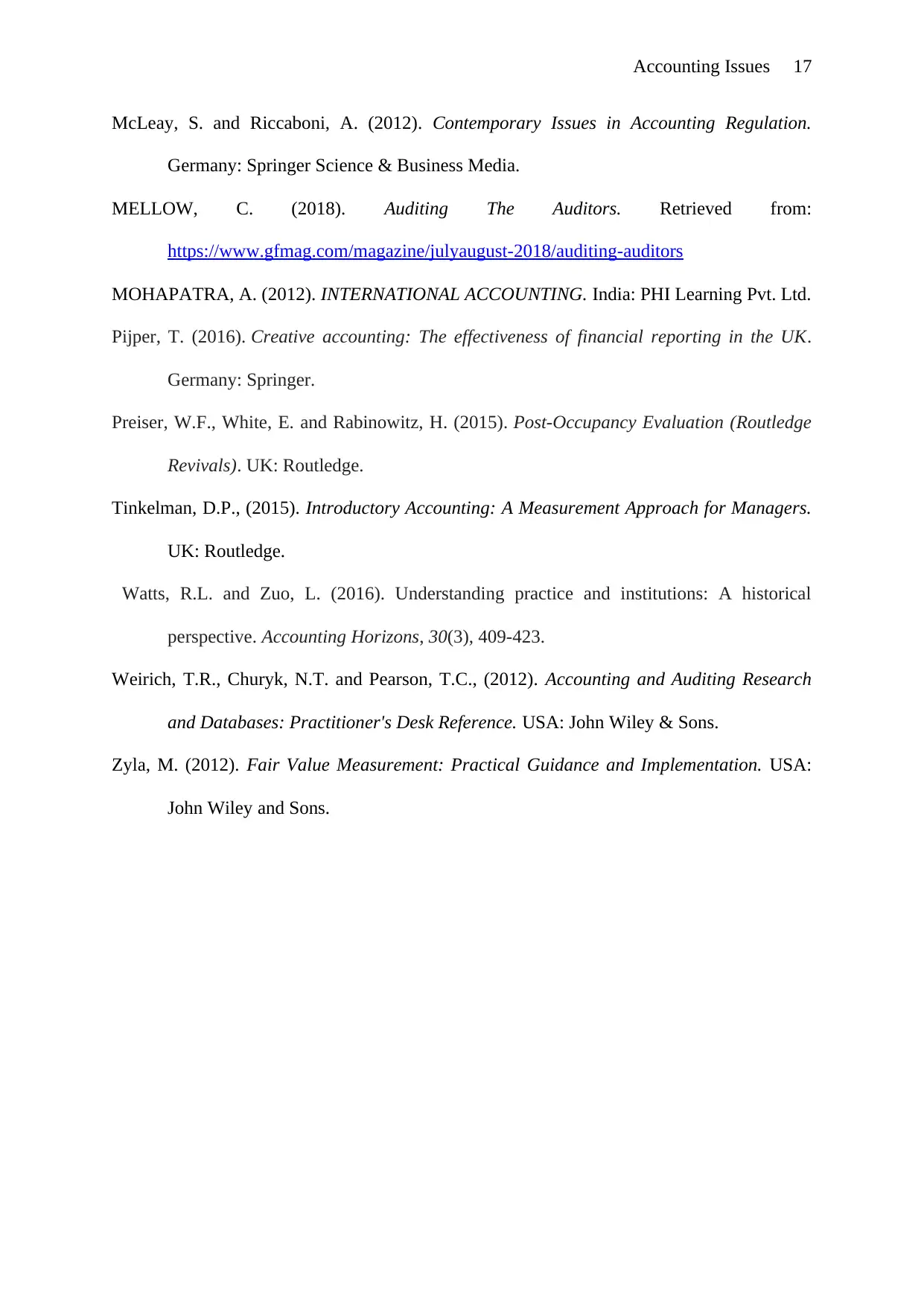
Accounting Issues 17
McLeay, S. and Riccaboni, A. (2012). Contemporary Issues in Accounting Regulation.
Germany: Springer Science & Business Media.
MELLOW, C. (2018). Auditing The Auditors. Retrieved from:
https://www.gfmag.com/magazine/julyaugust-2018/auditing-auditors
MOHAPATRA, A. (2012). INTERNATIONAL ACCOUNTING. India: PHI Learning Pvt. Ltd.
Pijper, T. (2016). Creative accounting: The effectiveness of financial reporting in the UK.
Germany: Springer.
Preiser, W.F., White, E. and Rabinowitz, H. (2015). Post-Occupancy Evaluation (Routledge
Revivals). UK: Routledge.
Tinkelman, D.P., (2015). Introductory Accounting: A Measurement Approach for Managers.
UK: Routledge.
Watts, R.L. and Zuo, L. (2016). Understanding practice and institutions: A historical
perspective. Accounting Horizons, 30(3), 409-423.
Weirich, T.R., Churyk, N.T. and Pearson, T.C., (2012). Accounting and Auditing Research
and Databases: Practitioner's Desk Reference. USA: John Wiley & Sons.
Zyla, M. (2012). Fair Value Measurement: Practical Guidance and Implementation. USA:
John Wiley and Sons.
McLeay, S. and Riccaboni, A. (2012). Contemporary Issues in Accounting Regulation.
Germany: Springer Science & Business Media.
MELLOW, C. (2018). Auditing The Auditors. Retrieved from:
https://www.gfmag.com/magazine/julyaugust-2018/auditing-auditors
MOHAPATRA, A. (2012). INTERNATIONAL ACCOUNTING. India: PHI Learning Pvt. Ltd.
Pijper, T. (2016). Creative accounting: The effectiveness of financial reporting in the UK.
Germany: Springer.
Preiser, W.F., White, E. and Rabinowitz, H. (2015). Post-Occupancy Evaluation (Routledge
Revivals). UK: Routledge.
Tinkelman, D.P., (2015). Introductory Accounting: A Measurement Approach for Managers.
UK: Routledge.
Watts, R.L. and Zuo, L. (2016). Understanding practice and institutions: A historical
perspective. Accounting Horizons, 30(3), 409-423.
Weirich, T.R., Churyk, N.T. and Pearson, T.C., (2012). Accounting and Auditing Research
and Databases: Practitioner's Desk Reference. USA: John Wiley & Sons.
Zyla, M. (2012). Fair Value Measurement: Practical Guidance and Implementation. USA:
John Wiley and Sons.
1 out of 17
Related Documents
Your All-in-One AI-Powered Toolkit for Academic Success.
+13062052269
info@desklib.com
Available 24*7 on WhatsApp / Email
![[object Object]](/_next/static/media/star-bottom.7253800d.svg)
Unlock your academic potential
© 2024 | Zucol Services PVT LTD | All rights reserved.





